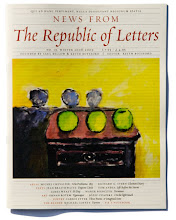For some reason which escapes me, the good folk at San Jose State have held an annual contest since 1982 in which contestants are urged to compete with the worst possible opening sentence of an imagined novel. The contest is named after the hugely successful novelist-cum-philanthropist and Dickens' close friend Edward Bulwer-Lytton because he began a novel with "It was a dark and stormy night. . .", the which innocuous phrase precedes every attempt by Snoopy to write a novel. The reason must be, in that citadel of learning, that someone has nothing better to do.
I will be accused of humorlessness, but I beg to differ with the principle. On the following grounds: (A) It is no great task to find far worse first sentences than Bulwer-Lytton's in existing novels written today, where they flourish by the dozen. (B) For Snoopy, already a literate and ambitious dog, that opening sentence certainly has a meaning and a reason behind it -- dogs don't like such nights; they shiver, bark, howl and cower. (C) Bulwer-Lytton, like many another neglected Victorian from the great age of the novel, was a writer of some substance.
Okay, so it's all in good fun. We like spoofs. The underlying truth is, however, that there are very few people left who can read Bulwer-Lytton: his language is alien, difficult, and requires effort and attention -- as does Dickens'. There is, on the Net, a professorial quiz which proposes that the reader identify specific passages of Dickens (presumably good) and Bulwer-Lytton (presumably bad). It is a tricky test and a false one. Other passages in either author could reverse the verdict. This gradual effacementof the literature of the past, and its language, is something we might deplore rather than seek to parody. My Oxford Edition of Our Mutual Friend contains many pages of notes to explain Dickens' fascination with, for instance, the specific languages of trades now long lost, doll-makers, conveyancing clerks, water-men, Philistines of the day and such. On my shelves is a treasured dictionary, the Dictionnaire du monde rural, in which one can recover the implements used in threshing, winnowing and other rural pursuits. Every language loses a part of its lexicon every day. Danbury, Connecticut, was the hat capital of America; now the only head-cover we see is the baseball cap. The loss is constant, and the language is not replenished by the conjugation or declension of 'f**k', which seems to be as far as common parlance goes. What is a writer to do if the language he uses erodes even as he writes?
It was a dark and stormy night when the profs of San Jose State thought they knew what bad writing was. Far greater pollution is shown daily and climate change can't be blamed for the poverty of our current language.
Lahti
2 years ago












